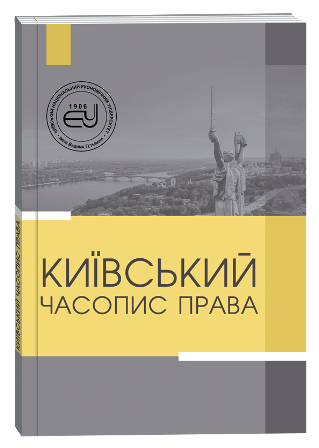LEGAL SUPPORT OF ARTIFICIAL INTELLIGENCE
DOI:
https://doi.org/10.32782/klj/2021.4.11Keywords:
digitalization, artificial intelligence, legal personality, legal regulation, legal responsibility, legal nature of artificial intelligence.Abstract
Abstract. This article examines the problems of legal qualification and status of artificial intelligence, analyzescase law and scientific approaches to the interpretation of the legal status of artificial intelligence to determine themodel of legal regulation of intellectual property rights to objects created by artificial intelligence. The main directionsof introduction of the process of digitalization in the field of artificial intelligence in Ukraine are revealed, attentionis focused on the main features of the introduction of artificial intelligence in Ukraine and the world. Possible areasfor improving the legal regulation of the status of artificial intelligence in Ukraine are identified, and also the mainperspective directions of development of the legislation in the field of artificial intelligence are forecasted.Artificial intelligence has been identified as an object of study in a number of scientific disciplines and is arather complex technical and philosophical phenomenon, and therefore the definitions proposed in science to definethe concept of artificial intelligence are very heterogeneous. Emphasis is also placed on the main characteristicsof artificial intelligence: technical (software) nature, ability to self-study in data processing, automated nature ofsuch training, autonomy in decision-making, focus on achieving results that people achieve in the process of theirintellectual activity.Given the isolated features that allow to establish the closeness of the nature of artificial intelligence to thenature of the computer program, given the dynamic and continuous development of artificial intelligence and theinadmissibility of this definition due to an exhaustive list of technologies that can lead to excessive narrowing of theterm and lead to the need for its constant revision, as well as given the requirement for technological neutrality ofregulatory definitions, we propose for legal purposes to define the concept of "artificial intelligence" as a computerprogram based on – algorithms of data analysis and algorithms of formation on the basis of such analysis ofalgorithms of autonomous decision-making for achievement of the certain purpose. We consider it inexpedientfor the purposes of legal regulation to classify artificial intelligence into weak and strong, because the only thingthat distinguishes these scientifically defined types of artificial intelligence is the functional content, which is notimportant in this case to determine the legal status of artificial intelligence.
References
Pan-Canadian AI Strategy. URL: http://www.jaist.ac.jp/~bao/AI/OtherAIstrategies/PanCanadian%20Artificial%20Intelligence%20Strategy.pdf (дата звернення: 10.12.2021).
America’s Leadership in Artificial Intelligence. 2019. URL: https://www.whitehouse.gov/articles/accelerating-americas-leadership-in-artificialintelligence/ (дата звернення: 10.12.2021).
Draft Memorandum to the Heads of Executive Departments and Agencies, “Guidance for Regulation ofArtificial Intelligence Applications”. 2019. 95 URL: https://www.whitehouse.gov/wp-content/uploads/2020/01/Draft-OMB-Memoon-Regulation-of-AI-1-7-19.pdf (дата звернення: 10.12.2021).
Communication from the Commission to the European Parliament, the Council, the European Economicand Social Committee and the Committee of the Regions, Artificial Intelligence for Europe. Brussels.2018. Vol. 25, No 4. 19 p. URL: https://ec.europa.eu/transparency/regdoc/rep/1/2018/EN/COM-2018-237-F1-ENMAIN-PART-1.PDF
Communication from the Commission to the European Parliament, the Council, the European Economicand Social Committee and the Committee of the Regions, Building Trust in Human-Centric Artificial Intelligence.Brussels. 2019. Vol.8, No4. URL: https://ec.europa.eu/transparency/regdoc/rep/1/2019/EN/COM-2019-168-F1-EN-MAIN-PART-1.PDF (дата звернення: 10.12.2021).
White Paper: On Artificial Intelligence – A European approach to excellence and trust. Brussels. 2020. Vol. 19.No2. URL: https://ec.europa.eu/info/sites/info/files/commission-white-paper- artificialintelligence-feb2020_en.pdf(дата звернення: 10.12.2021).
Концепція розвитку цифрової економіки та суспільства України на 2018-2020 роки: РозпорядженняКабінету Міністрів України від 17.01.2018 № 67-р. URL: https://zakon.rada.gov.ua/laws/show/67-2018-р (датазвернення: 10.12.2021).
Габов А. В., Хаванова И. А. Эволюция роботов и право XXI века. Вестник Томского государствен-ного университета. 2018. № 435. С. 215–233.
Баранов О.А. Інтернет речей і штучний інтелект: витоки проблеми правового регулювання. ІТ право:проблеми і перспективи розвитку в Україні: збірник матеріалів ІІ-ї Міжнародної науково-практичної конфе-ренції (Львів, 17 листопада 2017 р.). Львів: НУ «Львівська політехніка», 2017. С. 18–42.
Харіна М. Ю. До питання регулювання правового статусу штучного інтелекту в міжнародному правіта українському законодавстві. Молодий вчений. 2019. № 5(2). С. 500–503.
Архипов С.И. Субъект права: теоретическое исследование: монография. Санкт-Петербург: Юриди-ческий центр Пресс, 2004. 469 с.
Зайчук О. В., Заєць А. П., Журавський В. С. Теорія держави і права. Академічний курс: Підручник. Зазаг. ред. О. В. Зайчука, Н. М. Оніщенко. Київ: Юрінком Iнтер, 2008. 688 c.
Bryson J., Diamantis M., Grant T. Of, for, and by the People: The Legal Lacuna of Synthetic Persons. ArtificialIntelligence & L. 273 (2017). University of Cambridge Faculty of Law Research Paper. 2018. № 5. P. 273–291.
Кельзен Г. Чистое учение о праве. Пер. с нем. М.В. Антонова и С.В. Лёзова. Санкт-Петербург: ОООИздательский Дом «Алеф-Пресс», 2015. 542 с.
Цивільний кодекс України: Закон України від 19.06.2003 № 435-IV. Дата оновлення: 28.04.2020. URL:https://zakon.rada.gov.ua/laws/show/3792-12 (дата звернення: 10.12.2021).
Solum B. Legal Personhood for Artificial Intelligences. NORTH CAROLINA LAW REVIEW. 1992.Vol. 70,Nо 4. P. 1231–1287.
Васильев. А., Ибрагимов Ж. Правовое регулирование робототехники и искусственного интеллекта вЕвропейском Союзе. Российско-азиатский правовой журнал. 2019. № 1. С. 50–54.
Gaon A.-H. Artificially Intelligent Copyright: Rethinking Copyright Boundaries: dissertation … PhD.Toronto: York Universit, 2019. 390 p.
Genderen, R. van den Hoven. Do We Need New Legal Personhood in the Age of Robots and AI? Robotics,AI and the Future of Law, Perspectives in Law/ Fenwick, M., Corrales, M., & Forgo, N. (Eds.). Singapore: Springer,2018. P. 15-56.
Харитонов Є.О., Харитонова О.І. До проблеми цивільної правосуб’єктності роботів. Інтернет речей:проблеми правового регулювання та впровадження: матеріали наук.-практ. Конференції (Київ, 29 листопада2018 р.). Київ: Вид-во “Політехніка”. 2018. С. 42–46.
Пономарева Е. В. Субъекты и квазисубъекты права: теоретикоправовые проблемы разграничения:дис. … канд. юрид. наук. Екатеринбург, 2019. 208 с.
European Parliament resolution of 16 February 2017 with recommendations to the Commissionon Civil LawRules on Robotics 2015/2103(INL). URL: https://www.europarl.europa.eu/doceo/document/TA-8-2017-0051_EN.html (дата звернення: 10.12.2021).
Наведено за: Clarke R. Asimov's laws of robotics: implications for information technology-Part I. Computer.1993. Vol.26, Is.12. P. 53–61.
Морхат П.М. Правосубъектность искусственного интеллекта в сфере права интеллектуальной соб-ственности: гражданско-правовые проблемы: дис. … д-ра юрид. наук. Москва, 2018. 420 с.







